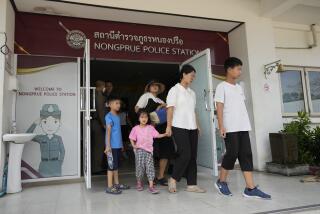China Quells Sect Protests, Detains About 40 Westerners
- Share via
BEIJING — About 40 Western followers of the outlawed Falun Gong meditation group were taken away by police Thursday after they mounted a series of protests in Tiananmen Square, the heart of the Chinese capital.
The demonstrators breached tight security to hold up signs in support of the banned movement, which the Chinese government has labeled an “evil cult” intent on subverting the state. Police quickly subdued the protesters and drove them away, according to a witness and a Falun Gong spokeswoman in the United States.
The protests came exactly a week before President Bush is scheduled to arrive in Beijing for a two-day visit. Falun Gong’s supporters want him to raise the issue of the ban on their movement and the Communist regime’s harsh repression of its members.
The group, which preaches conservative social values mixed with an eclectic blend of Buddhist and Taoist beliefs, claims millions of followers in China, where religion has mounted a big comeback in the past two decades. But since the government outlawed Falun Gong 2 1/2 years ago, the number of open practitioners has dwindled amid an aggressive campaign to root them out.
The group alleges that at least 1,600 members have died from state persecution, a number that cannot be independently verified. Thousands more have been shipped to labor camps.
Those detained Thursday were foreigners, including three who reportedly live in the Los Angeles area, Falun Gong representatives said. They probably will be expelled from China within a day or two, as has been the case previously.
Daniel Sanchez of Pasadena said his daughter Gina, 29, also of Pasadena, was in Beijing to join the demonstration and may have been arrested.
Gina Sanchez, an herbalist and acupuncturist who practices in Santa Monica, traveled to China with two other local followers of Falun Gong: Mark Gardner, 22, a college student from Brea, and Albert Roman, 25, a Palos Verdes Peninsula financial consultant.
Sanchez said his daughter called him several times a day until Thursday, when her calls stopped. “I don’t know for a fact she’s been arrested, but I’m assuming so because she should have called by now,” he said.
The protesters slipped through a security cordon to get into Tiananmen Square, a popular tourist spot jammed this week with people celebrating the Chinese New Year. Police demanded to look at tourists’ identity papers and checked the bags of those entering the plaza.
Foreign journalists were tailed throughout the day, in apparent anticipation of the afternoon’s events. In the past, Falun Gong practitioners have used public holidays to stage larger demonstrations.
About 2 p.m., small clusters of adherents unfurled banners and shouted slogans in different areas of the square, prompting police to rush in and subdue them. Gail Rachlin, a Falun Gong spokeswoman in New York, said some of the demonstrators were punched and kicked.
State media accused the protesters of ruining the holiday spirit. “This turmoil at the center of the Chinese capital was aimed to undermine the happy atmosphere of the [new year],” the official New China News Agency said.
The protest was at least the fourth in the last six months involving foreign members of Falun Gong. Earlier this week, two North American practitioners were expelled after demonstrating in Tiananmen Square. In November, a few dozen Westerners took part in a protest similar to Thursday’s demonstration.
The latest show of defiance was timed to coincide with the lunar new year but also to draw attention to the crackdown on Falun Gong before Bush’s planned visit.
Analysts say Bush may well bring up the issue of religious freedom with Chinese leaders. But any mention is likely to concentrate on Christians in China, millions of whom worship in underground churches.
Recently, headlines around the world focused on the arrest, conviction and release of a Hong Kong man accused of smuggling Bibles into China for distribution to an unregistered Christian sect.
By contrast, Falun Gong has faded somewhat from world view after exploding into prominence in April 1999, when thousands of adherents surrounded the central government compound in Beijing to complain about bad publicity the group had received. Falun Gong was banned three months later.
In part, its lowered profile over the past year reflects the authorities’ success in stamping out Falun Gong or driving its adherents deep underground, especially after several suspected practitioners immolated themselves in Beijing in January 2001--an event that helped harden public attitudes toward the group.
*
Times staff writer Peter Y. Hong in Los Angeles contributed to this report.
More to Read
Sign up for Essential California
The most important California stories and recommendations in your inbox every morning.
You may occasionally receive promotional content from the Los Angeles Times.














